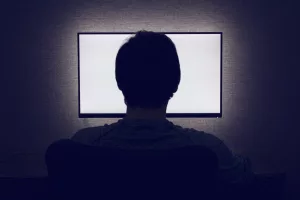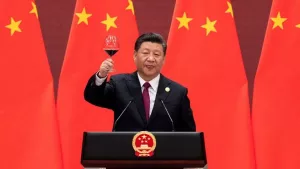On the night of March 12-13, the 95th Academy Awards ceremony, also known as the Oscar ceremony, took place at the Dolby Theatre, in Los Angeles. American comedian Jimmy Kimmel was the host for the third time. Among the awards in 23 categories, the prize for the “Best Documentary Feature” went to “Navalny”. It is worth noting that this is not the first award that “Navalny” has won. In February, the documentary received the British Academy Award BAFTA.
The documentary tells the story of the politician’s poisoning by the Russian authorities, his subsequent recovery in Germany, search to uncover the truth about the attempted assassination, and his decision to return home to Moscow despite the danger of being unlawfully imprisoned. The documentary deeply touched many people around the world, including me, as it talks about human bravery to oppose the dictatorship in my home country. Something that will always be a very sensitive topic for me.
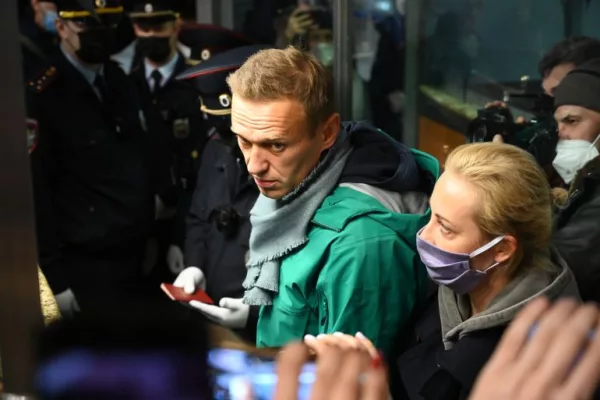
Together with Canadian director Daniel Roher, Navalny’s family – his wife Yulia, daughter Daria, and son Zakhar – went on stage to receive the award on behalf of Alexei. In addition, investigators Christo Grozev and Maria Pevchikh attended the ceremony. They played a key role in making the film and searching for material proving the involvement of Russian special services in the poisoning of the politician. Maria Pevchikh has been working in Navalny’s Anti-Corruption Foundation for more than 10 years and recently was appointed as the chairwoman of the board of directors of the Foundation. Christo Grozev, an investigative journalist of Bellingcat, met Alexei Navalny while he was recovering in Germany after a failed attempt to kill him with the nerve agent “Novichok” in August 2021.
While Navalny’s family and colleagues had a unique opportunity to thank the Academy and one more time mention Navalny’s name from one of the world’s biggest stages, Alexei was one of the last people who found out that the documentary about his extraordinary life won the most prestigious award. “Court in Kovrov, morning. Cell with bars, video link. Alexei’s lawyer tells him that the film won an Oscar. I think this will be the most astounding victory announcement ever,” that is how Navalny’s press secretary Kira Yarmysh described that moment.
Alexei Navalny has been imprisoned for more than 2 years, experiencing torture, violation of his rights as a prisoner, and complete absence of rule of law. He was thrown in the punishment cell 12 times for things such as “regularly unfastening his top button” and “not holding his hands behind his back for 3 seconds”. There is a long list of absurd reasons he received this punishment for.
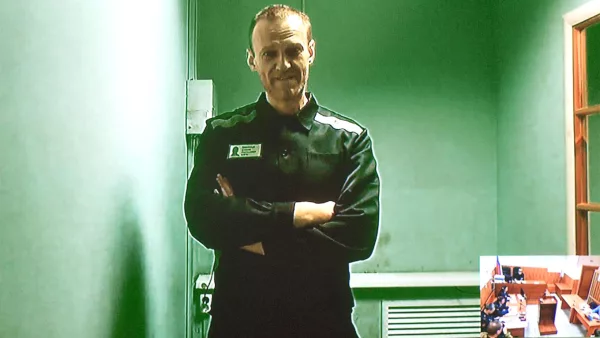
However, not everyone took the news of the movie’s victory with joy. I’m talking about Ukraine and the Ukrainians. Firstly, according to the Ukrainian authorities, President Volodymyr Zelensky was denied the opportunity to speak at the ceremony and once again remind the world that Ukraine has been in a full-scale war started by Russian President Vladimir Putin for over a year now. “If Oscar is outside of politics how should we understand the documentary manifesto Navalny where internal Russian politics is overflowing?” Mykhailo Podolyak, an adviser to the head of Ukraine’s president’s office, said in a tweet. For the second year in a row, the Academy has reportedly rejected a request from Zelensky to speak on the grounds that the event isn’t political.
A great answer to this question from Podolyak was given by aforementioned Christo Grozev: “It’s unfortunate that even Ukrainian officials who should/do know better than Kremlin dictators how democracy works, conflate a free vote by a thousand of film-makers with a decision by the event organizers.” Grozev definitely has a point: freedom of the jury to vote for a movie has little to do with turning the Oscars stage into a political tribune. To say more, no American president was ever given the floor to speak at the Oscar ceremony.
I think there are several sides of the same coin here and the moral issue is quite complex. To be clear, I believe that while his country is at war, President Zelensky deserves the opportunity to speak from every major world stage. And, let’s be honest, he had plenty of those opportunities over the past year. The US Congress, the G20 summit, the EU Parliament – this is an incomplete list of the tribunes from which Zelensky conveyed a vital message to the world – Ukraine will need military aid as long as Putin continues his brutal attacks on the country, and that Ukraine will never surrender.
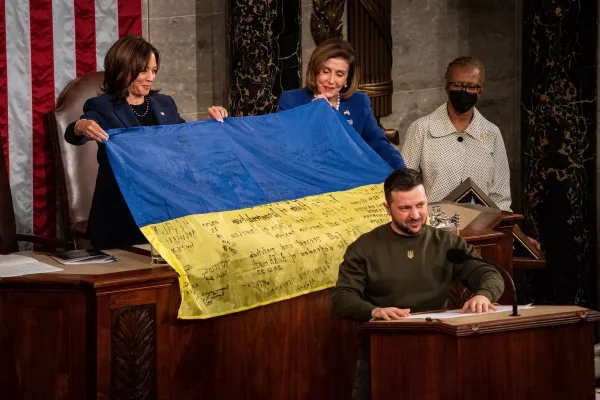
(Kent Nishimura / Los Angeles Times)
However, it is quite unfair to compare Zelensky’s request to speak and the victory of the documentary about Navalny. First, it is not Navalny who won the award. To a large extent, it is the director, his crew, and investigative journalists. Navalny’s role in that movie was described the best by Alexei himself: “I dedicate my entire contribution to this film to honest and courageous people across the world who day after day find the strength to confront the monster of dictatorship and its constant companion, war. I am, of course, terribly glad, but while rejoicing, I try not to forget that it wasn’t me who won the Oscar.”
Thus, it is not Russian politics against Ukrainian. It is filmmakers who voted for a movie that reveals the actual face of dictatorship – deaths, crimes, and corruption. And what it takes to oppose these evil things for ages. What it takes to fight Putin and his surroundings for ages. Isn’t it what Ukrainian authorities are doing right now as well? Navalny has laid down his life to fighting Ukraine’s main enemy. His colleagues from the Anti-Corruption Foundation constantly give Ukrainian activists and politicians a platform to speak about war and treat them with the utmost respect.
Moreover, many western experts agree that the end of the war in Ukraine strongly depends on the change of the political regime in Russia. Navalny, as a Russian main opposition leader in the past, did a lot to increase the possibility of such change. Taking all of that into account, we can definitely see why members of the Academy chose this particular documentary over the rest of the nominees.
Furthermore, Ukrainians can’t forget Navalny’s nationalistic claims about Russian minorities, his stance that “Crimea is not a sandwich to give back and forth,” as well as his participation in ultra-nationalist marches in Russia in the 2000s. Although the movie does touch on Navalny’s nationalist views and his dalliance with far-right forces, it seems not to be enough for Ukrainians to forgive Navalny. Even Christo Grozev who also had some prejudice before actually meeting the Russian politician told POLITICO in February that Navalny “has evolved from an opportunistic populist to a staunch democrat with liberal democratic values.”
The turning point could be the fact that Navalny and his Foundation published a list of statements that clarify what the political prisoner thinks about the war in Ukraine and the future of Russia.“What are Ukraine’s borders? They are similar to Russia’s — they’re internationally recognized and defined in 1991. Russia also recognized these borders back then, and it must recognize them today as well. There is nothing to discuss here,” that is what Navalny thinks about the territorial integrity of Ukraine. So, the Russian politician recognizes Crimea as a part of Ukraine.
And, perhaps, the last weighty complaint is attributed by the Ukrainians not to Alexei himself, but to his wife. Yulia, during her 15-second speech on the Oscars stage, did not say a word about the war in Ukraine, but instead thanked the Academy and made an emotional speech about her husband.
Many would say that Navalny’s family struggle is nothing compared to thousands of Ukrainian families suffering from bombs. What Ukraine as a nation has been going through in the past year simply can not be measured, to say the least. Nevertheless, those are different types of pain. Navalny’s family is forced to see their husband and father trapped in prison, experiencing a variety of inhuman behavior toward him. And they know it is going to last as long as Putin stays in power. So the least they can do is raise awareness about Navalny’s case as it can guarantee some sort of protection for him.
Lastly, the comparison between the famous family of the main opposition leader and the average Ukrainian family suffering from Russian attacks is just morally wrong. Putin’s regime has not only condemned the country to abject poverty but mercilessly puts in jail anyone who disagrees with the war in Ukraine and openly speaks their mind. Harsh new criminal sentences tear apart families and make children orphans with no future in a dictatorial country. There are plenty of such examples. That is where comparison becomes fair, even though little to nothing can be compared to people’s tragedy in Ukraine.
Personally, these accusations against a woman whose husband is in the hands of the dictator Putin, sound absurd. As we all know, the winners have only 2 minutes to make a statement on the stage and thank the Academy for their award. In the case of the documentary “Navalny,” most of the time the director deservedly spoke.
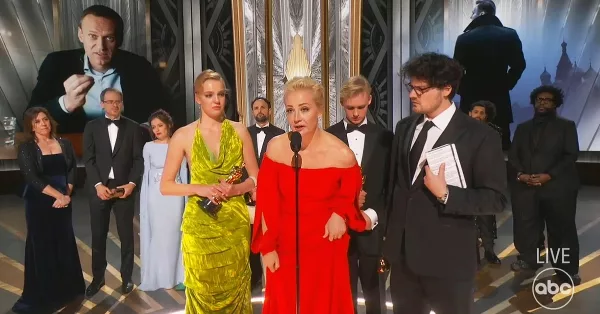
It is important to note that he vividly and uncompromisingly condemned the war in Ukraine, quoting the words of Navalny. “Alexei Navalny, the leader of the Russian opposition, remains in solitary confinement for what he calls – I want to make sure we get his words exactly right – ‘Vladimir Putin’s unjust war of aggression in Ukraine,’” Roher said.
Next, he passed the floor to Yulia, who, understandably, reminded the world of what is currently happening to her husband.
“My husband is in prison just for telling the truth. My husband is in prison just for defending democracy. Alexey, I’m dreaming of the day when you will be free and our country will be free. Stay strong, my love,” she said to applause.
I do believe that is what any loving wife would say if she was ever in Yulia’s position. To say more, I truly hope none of those who are accusing Yulia nowadays will ever be in her shoes.
Another reason why Yulia did not mention the war in Ukraine may also be the fact that currently in Russia you may face a criminal sentence under the article on “discrediting the Russian army”. Any statement against the war in Ukraine falls under this article and Yulia is of course aware of this. If she is charged under this article, she will not be able to visit her husband in prison which would be a great tragedy for both spouses.
But back to the award ceremony and to the moment when the Oscar went to “Navalny”. To be completely honest, I watched that scene over 10 times and every time it almost brought tears to my eyes.
I would like to quote the director Daniel Roher one last time as he accepted the Oscar at the ceremony in Los Angeles. I genuinely believe his words convey a very strong and important idea.
“I would like to dedicate this award to Navalny, to all political prisoners around the world. Alexey, the world has not forgotten your vital message to us all. We cannot, we must not be afraid to oppose dictators and authoritarianism wherever it rears its head.”
May we never forget these words.
Featured image: retrieved from https://www.bbc.co.uk/programmes/m0016txs


